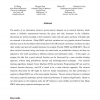Free Online Productivity Tools
i2Speak
i2Symbol
i2OCR
iTex2Img
iWeb2Print
iWeb2Shot
i2Type
iPdf2Split
iPdf2Merge
i2Bopomofo
i2Arabic
i2Style
i2Image
i2PDF
iLatex2Rtf
Sci2ools
128
click to vote
TREC
2004
2004
Can We Get A Better Retrieval Function From Machine?
The quality of an information retrieval system heavily depends on its retrieval function, which returns a similarity measurement between the query and each document in the collection. Documents are sorted according to their similarity values with the query and those with high rank are assumed to be relevant. Okapi BM25 and their variations are very popular retrieval functions and they seem to be the default retrieval function for the IR research community; and there are many other widely used and well studied functions, for example, Pivoted TFIDF and INQUERY. Most of these retrieval functions being used today are made based on probabilistic theories and they are adjusted in real world according to different contexts and information needs. In this paper, we propose the idea that a good retrieval function can be discovered by a pure machine learning approach, without using probabilistic theories and knowledge-based techniques. Two machine learning algorithms, Support Vector Machine (SVM...
Related Content
| Added | 31 Oct 2010 |
| Updated | 31 Oct 2010 |
| Type | Conference |
| Year | 2004 |
| Where | TREC |
| Authors | Weiguo Fan, Wensi Xi, Edward A. Fox, Li Wang |
Comments (0)

